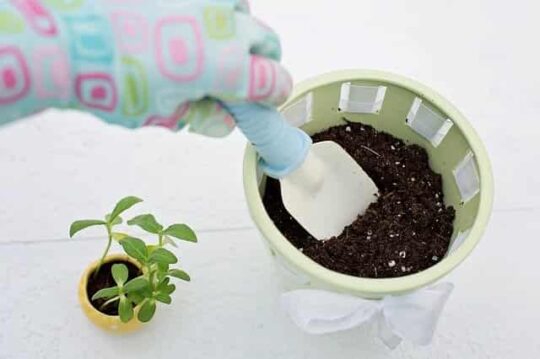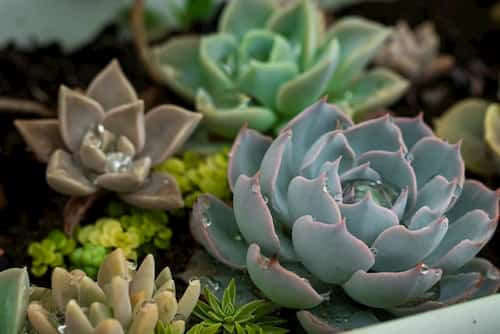Succulents can adapt well to most soil conditions even in conditions of awful drainage & nutrition deficiency. However, if you want them to grow best and produce vibrant colorful flowers providing them with the right soil mix is the first step in that process. So,
Is Vermiculite good for Succulents? Vermiculite will lead to the robust growth of succulents, cactuses & other indoor potted plants as it will improve the soil aeration, help the roots to better absorb soil nutrients, soak the excess moisture from the roots & keep the soil structure compact in the longer run.
Vermiculite is normally used for growing plants that loves damp soil. However as succulents & cactuses love drainage-friendly soil that gets rid of the water quickly,
Make sure to use smaller amounts of vermiculite along with fair share of other inorganic materials like coarse sand, pumice, volcanic rocks, pebbles, and gravels to prepare the soil mix for succulents and cactus.
- These will make sure the soil does not retain moisture for long as succulents hate moist conditions. The vermiculite will provide the soil to hold water for the right amount of time in which the roots can absorb the required amount of water quickly.
Table of Contents
What does Vermiculite mean? Should You Add it to the soil?
- Adding vermiculite in the soil will help in enhancing the nutrient quality of the soil and will facilitate faster and healthier growth of the succulents.
- They help the roots to breathe and to spread comfortably underground. The development of stronger roots will be directly reflected in the upper parts of the plant.
- However, it’s not an absolute necessity to add it to the soil mixture. This is especially true if you are thinking about using it for succulents and cactuses. It is something that will just give the potted plants a slight growth boost but adding too much vermiculite can do more harm than good. So it is something to be wary of.
Always make sure you buy horticultural vermiculite and not insulating vermiculite as the latter one is used in the construction sector and it won’t be suitable for growing plants.
5 Benefits of Adding vermiculite in the Soil for growing succulents and other houseplants
Vermiculite is Non-toxic and resistant to rots
Horticultural vermiculite which can be bought online or from the gardening stores is generally fully sterile. They are processed under heat and are made completely sterile.
- It is chemically nonreactive to other soil components. So adding vermiculite can save you from constant headaches. Another plus point is as they won’t decompose with time, it won’t produce odor in the soil.
Helps in Faster Growth of the Plant
Vermiculite help in better nutrient and water retention in the soil. Even though succulents dislike having damp soil however the soil needs to be kept moist for at least a few hours in order to give the roots enough time to absorb water.
- So in case you have a soil mix that is extremely drainage friendly and rich in organic components like sand, gravels, pebbles, etc using vermiculite will help in providing better support for the roots as it will hold water just long enough for them to absorb.
- This means it will also absorb the excess moisture present around the root bulb hence removing the chances of root rot.
Also as it can trap nutrients better and by default is rich in mineral content, it will keep the nutrition levels of the soil compact and support better root development. Better root development is directly related to better & faster growth of the plants.
Vermiculite has got a Neutral pH
Succulent like all major plants is quite sensitive to soil pH. They can put up with a pH range of 5 to 8 however they grow best under slightly acidic conditions of pH 6 to 6.5. So it is important to know about the pH of every component you add to the soil as that can directly affect the soil pH.
- Ideally, you should use soil components that must not affect the soil pH heavily.
- Luckily vermiculites are one of those components which has got a neutral pH. So adding them won’t make any difference to the soil acidity or alkalinity.
Provides Suitable Structure to the Soil
Vermiculite helps in providing suitable shape and texture to the soil mix and keeps it compact. Moreover, as it has got a neutral pH you can use it to balance it out as per the need of the soil. It holds the soil together and helps in improving the nutrition retention ability of the soil.
- However, vermiculite is extremely lightweight and can easily be mixed in with any form of soil mix.
It helps in Improving the Soil Aeration
Aeration is something which is extremely essential for potted indoor plants. Proper soil aeration helps in providing a healthy dose of oxygen to the roots and reduces the chances of fungal or bacterial infection in the roots.
This helps in the better development of the roots and encourages them to go deeper. Plants with stronger roots have a much better chance of flourishing than ones with weaker ones.
- Suitable aeration also facilitates better drainage and distributing moisture evenly in the soil. This is something extremely beneficial for the succulents.
- Most of the succulents die because of poor drainage or overwatering and this is why if the soil supports aeration then it will help in drying the soil up quicker.
How to add Vermiculite to the soil?
You can add the store-bought vermiculite directly into the soil mix or the compost and mix them thoroughly so that it gets evenly distributed. The fact that it acts as a heat insulator and also provides suitable aeration to the soil makes them suitable to be used in the soil for germinating seeds.
You can use vermiculite all alone with the potting soil mix containing the inorganic materials. Or you can mix them with the peat and compost.
Which plants like vermiculite?
- Even though succulents prefer quick-draining soil and hate to sit on damp soil for hours, it still needs the soil to hold moisture for a short period of time so that the roots can absorb just enough water. Using a little bit of organic matter with pumice and vermiculite helps the soil to do just that.
Which is better vermiculite or perlite?
- Having said that vermiculite also brings a lot of benefits to the table which perlite does not. Perlite lacks the nutritional aspects of vermiculite which is beneficial for succulent growth.

Can you mix perlite with vermiculite?
You can mix both of them in the soil mix and that will help in better growth of the plant.
In the case of plants that love drainage friendly soil, you should always add smaller amounts of vermiculite as by doing that you get the benefits of the vermiculite and on the other hand as you will be adding loads of other inorganic components so the water retentivity aspect of the vermiculite will get balanced out suitably well.
- So the best thing to do is, add a little bit of vermiculite in the compost and then add a fair share of perlite along with coarse sand & gravels with the potting soil containing compost.
- Using both of them will provide the soil with better structure, help the roots to breathe better, improve the soil compactness, enhance drainage, and also provide the roots with better nutrition.
Does vermiculite decompose?
What kind of vermiculites should you buy?
Extra measures to take while mixing vermiculite in the soil
- There is no one particular recipe for using the soil components for your succulents. Always make sure you add smaller amounts of vermiculite for preparing the succulent soil. Just let it sufficiently mix with 25% of the potting soil rich in compost and other organic materials. Then add the rest 75% of inorganic components and mix all of them together.
- Never use too much vermiculite as doing that will decrease the drainage ability of the soil and will harm the succulents.
- There is no hard rule that you have to use vermiculite for growing succulents. If you wanna keep things simple, you can just go for normal cactus mixes. If you prefer making your own soil then you can experiment from time to time with various amounts of different components.
Conclusion
Preparing the soil mix for succulents is something we all flex over. This is because the plant health will be directly related to the soil components and their nutritional quality. Adding vermiculite is never a must for preparing succulent soil however adding them in controlled and calculated portions is the way to go.
This is because by doing that you will catch on all the benefits it brings to the table and also won’t have the issue of hampering the soil drainage quality.
So will you experiment with vermiculite for preparing succulent soil? Let me know in the comments…
Also Read:
